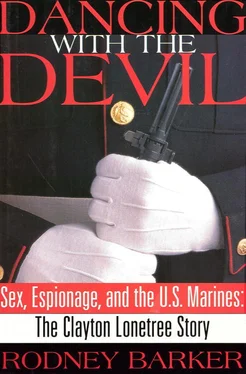The CIA man’s reaction was calculated to let the air out of McCullah’s wrath. He apologized while trying to put a positive spin on things. “Technically he was not in custody. He was allowed to go about his rounds. He was even late to a couple of meetings, missed one, and returned to his barracks each night.”
It was an arguable point, sure to be raised by a sharp defense attorney.
“What about physical evidence? Have any of your agents checked out his quarters?” McCullah asked.
The CIA man shook his head. To his knowledge Lonetree’s quarters had not been searched.
“And his handlers. Have they been ID’d?”
The look on the Agency man’s face was enough to let McCullah know the answer to that one.
“Jesus Christ,” he muttered. Even though the CIA wasn’t a law-enforcement agency, he’d have thought they would at least have covered the basics.
“I’ll see to it,” he was assured.
His mind racing as he scanned the cables, McCullah came up with another idea. “It says here Lonetree is supposed to meet with his Soviet handler next on the twenty-seventh. That’s five days off. How about having one of your guys cover the meet? If Lonetree says he’s supposed to meet Ivan Yakovich on Saturday at ten in front of the church, and Ivan shows up Saturday in front of the church, I want that established.”
McCullah was promised it would be done, and that he would be kept informed of all developments from here on out.
I doubt that, McCullah thought. The Agency had a reputation for releasing information on a need-to-know basis—and even then only when it was to its own advantage. He just had to hope that nothing was being withheld that would be critical to the investigation.
In the meantime, now that the case belonged to him, the most important thing was to get on the line to the regional director in London and order him to send his best counterintelligence agents to Vienna and discreetly withdraw the suspect.
• • •
Waiting for Sergeant Lonetree and Little John in the coffee shop of the International Hotel were three NIS agents who had flown in from London the previous afternoon. Special Agent David Moyer combined the comfortable corpulence and easygoing manner you would expect of a desk sergeant with the smarts of a street cop. He was accompanied by two junior members of his counterintelligence squad, Gary Hardgrove and Andrew Sperber, whose clean-cut, conservative appearances were almost interchangeable. This was going to be their first encounter with Sergeant Lonetree, but earlier that morning they had been updated by Big John and Little John and presented with three stapled packages of cables and a summary of what Lonetree had revealed. There were blank spaces on a number of the documents, indicating the Agency was supplying them with a redacted version of the communications, but this didn’t concern the agents because they didn’t expect their interrogation to proceed along the lines of tell-us-what-you-told-them.
“Clayton, these gentlemen are government agents,” Little John said. After a round of handshakes, Little John excused himself, saying, “Sergeant, I’m going to leave you with these guys. Try to help them with what they want.”
Lonetree said, “Okay,” and when Moyer suggested they take a cab back to his hotel, where they could order some sandwiches and continue to talk, he agreed to that, too.
It was snowing heavily outside, blizzard conditions and no taxis waiting. Trying to be helpful, Lonetree dashed out into the street to flag a passing cab. His quick movements startled the agents, who mistook them for an escape attempt, and they lunged toward him. When they realized Lonetree’s real intention, they tried to laugh it off and casually called him back to the curb. But an exchange of looks sent a signal to the Marine: This was different from what had gone on before.
Once they arrived at the Strudelhof Hotel, Agent Moyer took Lonetree up to his third-floor room while the other two agents stopped at the desk to order some food. Upstairs, they took their coats off and made themselves comfortable. It didn’t even faze Lonetree when Moyer pulled out his NIS credentials and explained, “Clayton, we are going into a criminal phase of the investigation now. Any statements you made to Little John are completely inadmissible and can’t be used against you. It is your right not to talk to us unless you want to. You are also entitled to have a lawyer present.”
Sitting on a couch, Lonetree said he understood. Not only did he initial the boxes that waived all his rights, he put his signature on a form giving the NIS permission to search his room for evidence.
Special Agent Moyer was not surprised at Lonetree’s complete cooperation at this point. Eighty percent of the people he warned didn’t ask for a lawyer. Most tried to lie their way out. In Lonetree’s case, he thought the sergeant was forthcoming because he felt bad and wanted to make amends. Moyer was touched when, just before Agent Hardgrove was about to leave to search Lonetree’s room at the Marine barracks, the sergeant expressed concern about what his buddies would be told. So they devised a cover story. If asked, the NIS agent would say it was a drug investigation.
After Agent Hardgrove left, Moyer and Sperber sat around and basically let Lonetree talk. They obtained biographical data, asked him if there had been any problems in his relationship with Big John, and inquired about his contacts with Soviet intelligence. But they listened for the most part because they did not want to do or say anything that would lead Lonetree to terminate at this time.
After almost three hours of conversation, much of it taped, Moyer asked Lonetree if he would mind staying at the Strudelhof with them overnight. If Lonetree had declined and insisted on returning to the barracks, he would not have been free to go. He would have been officially apprehended, and there were handcuffs and restraining devices in Moyer’s briefcase in the event he resisted. This was a point that Lonetree’s lawyers would later harp on—their client was under arrest but didn’t know it, and if he had been informed, he would have stopped talking and requested an attorney. But Lonetree wasn’t thinking along these lines, and said that would be fine with him.
Long after Lonetree had retired to an adjoining room, Special Agent Moyer remained sitting in a chair in the company of troubled thoughts. His instructions were to withdraw Lonetree as rapidly and quietly as possible, and he had made reservations on an early-morning Air Austria flight to London. Between now and then he had nothing better to do than worry. About whether the KGB had them under surveillance, and if they would be daring enough to try to intercept them. About whether Lonetree was a defection risk and would make a scene when he was told they were going to London to continue the conversation.
Moyer did not sleep at all that night. He turned on the TV and found an English-language channel that was running the movie Silverado on a continuous loop. It was entertaining the first time around, but by the third and fourth time the images on the screen might as well have been wallpaper.
They arrived back in London on the twenty-fifth, Christmas Day, flying into Heathrow Airport. Lonetree was continuing his cooperation. Not only had he agreed to the proposal they move their meeting to London, after they had checked into a suite of rooms at the Holiday Inn, when Moyer asked him if he wanted to hold off answering more questions until after Christmas, the sergeant said, “No, I want to go ahead with it right now.”
For the next three days Sgt. Clayton Lonetree was interrogated by NIS agents on a rotating basis. After that, a statement was presented to him that represented his “confession.” It wasn’t a verbatim transcript; it was drafted off notes scribbled by the agents and typed by a secretary sitting at a computer in an adjacent room. But Lonetree was given the chance to proofread it for accuracy, crossing out mistakes and misunderstandings and writing changes in the margins that were authenticated by his initials.
Читать дальше












